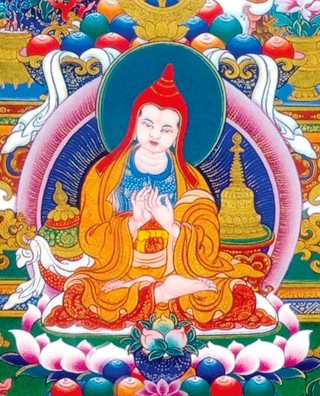Lojong: Difference between revisions
Jump to navigation
Jump to search
mNo edit summary |
No edit summary |
||
| Line 4: | Line 4: | ||
==Further Reading== | ==Further Reading== | ||
*Geshe Thupten Jinpa (translator), ''Mind Training: The Great Collection'' (as part of an anthology of early lojong texts), Wisdom Publications, 2005 | *Geshe Thupten Jinpa (translator), ''Mind Training: The Great Collection'' (as part of an anthology of early lojong texts), Wisdom Publications, 2005 | ||
==Teachings Given to the [[About Rigpa|Rigpa]] Sangha== | |||
*[[Alak Zenkar Rinpoche]], Haileybury, UK, 12 April 2012 | |||
==Internal Links== | ==Internal Links== | ||
| Line 13: | Line 16: | ||
==External Links== | ==External Links== | ||
*{{LH|topics/lojong/translations|Lojong series at Lotsawa House}} | *{{LH|topics/lojong/translations|Lojong series at Lotsawa House}} | ||
[[Category:Key Terms]] | [[Category:Key Terms]] | ||
[[Category:Prayers and Practices]] | [[Category:Prayers and Practices]] | ||
[[Category:Lojong]] | [[Category:Lojong]] | ||
Revision as of 12:32, 13 April 2012

Lojong (Tib. བློ་སྦྱོང་, Wyl. blo sbyong) — literally ‘training the mind’, or ‘transforming the mind’. These teachings, which emphasize the practice of bodhichitta and especially relative bodhichitta and the 'exchanging oneself for others', were introduced to Tibet by Lord Atisha in the eleventh century. Unlike the lamrim teachings, which were also introduced by Atisha at the same time, and which can be practised by anyone, the lojong teachings are intended primarily for disciples of the highest capacity and were not taught widely until the time of Geshe Chekawa.
Further Reading
- Geshe Thupten Jinpa (translator), Mind Training: The Great Collection (as part of an anthology of early lojong texts), Wisdom Publications, 2005
Teachings Given to the Rigpa Sangha
- Alak Zenkar Rinpoche, Haileybury, UK, 12 April 2012
Internal Links
- Eight Verses of Training the Mind
- Seven Points of Mind Training
- Tonglen
- The Wheel Blade of Mind Transformation